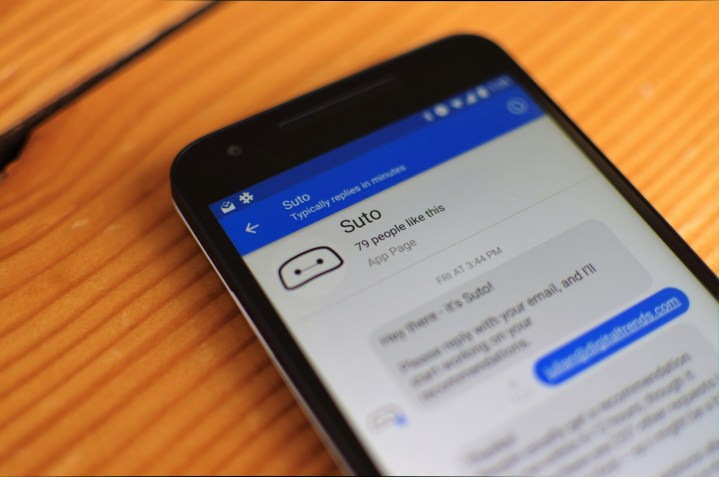
Suto wants to capitalize on that market research — with research. But what the San Francisco-based company is doing isn’t exactly anything new, and how they do it isn’t complicated at all.
Say you’re looking to buy a new graphics card, or a new pair of headphones, but you don’t want to bother doing the research, or you’re just too busy. Head over to AskSuto.com and you can ask the cute little bot “what’s the best graphics card under $300,” or, “What’s a good pair of headphones for using while working out.” You would tailor these questions to your own liking, of course.
Once you ask the question, Suto will ask how you want to continue the conversation, and will offer options to move the conversation to SMS, email, or Facebook Messenger. Karim El Rabiey, the company’s CEO and co-founder, told Digital Trends that the company is open to having Suto compatible with multiple messaging platforms like Slack, WhatsApp, and more. The Facebook Messenger integration is down at the moment, as the company is still trying to work out some kinks on
When it did work, it was quick and seamless, just like it is on SMS. Suto will message you first on the platform you chose, saying, “Hey there — it’s Suto! Please reply with your email, and I’ll start working on your recommendations.” Once you provide your email, Suto will say that users typically get a recommendation within 6 to 12 hours. He’ll go on to say how many people are waiting for recommendations, and that should you want to add more details to your question, you’re free to send them whenever. These first messages from Suto are the bot.
The six-person team, two of whom are the co-founders, then starts researching products in the category, pooling from reviews on Amazon to published reviews from websites. They try to gather as much data they can to match the product as best as they can to the person’s requests, and they will continue to ask questions if they need more information. Once you get a recommendation, Suto will explain why it’s recommending the product to you and will offer a link to purchase the product.
“It’s more important to focus on actually getting people to purchase based on our recommendation, even if today it’s not building revenue.”
Rabiey said the company will provide links to its partnered retailers, like Amazon. The company has 12 partnerships so far, but if your product isn’t sold through one of those retailers, then Suto will still offer the link to where you can purchase it.
“It’s more important to focus on actually getting people to purchase based on our recommendation, even if today it’s not building revenue,” Rabiey said. “The reason being that once we have a certain scale, we can start actually leveraging our own power and working with retailers one-on-one, online and offline, creating deals with people and giving people coupon codes.”
Rabiey said typically Suto gets 100 to 150 requests a week, but last week they saw around 350 requests, as the company was featured on Product Hunt. He said typically a recommendation can come under four hours, and the hope is that as the company grows, more work will be done by the bot so that it can handle more tasks and reduce the turnaround time for a recommendation — to a few minutes.
Recommendations that people follow through on are displayed on the website, so that in case someone has a question that’s quite similar, they can see what other people purchased. Similarly, Rabiey said as the company continues to research products, the time it takes to deliver recommendations gets shorter as they gain more knowledge about certain products and categories.
Rabiey said the idea for Suto came when co-founder Nima Gardideh was looking to buy a projector, but couldn’t make a comfortable decision after a two weeks of research. The two decided to put their phone numbers on a website, and told people they would offer recommendations for products if they texted the numbers — and that’s what they spent their weekends doing.
Within four to six weeks, they realized that about one in three people were actually buying the products they recommended — which was surprising to them, as they were two unverified strangers who put their phone numbers online. They quit their full-time jobs and launched Suto officially in November of 2015. Right now they’re going through a Y Combinator fellowship.
But their idea isn’t original, as there have been other players in this field before, such as ClayValet, which also read requests and offered recommendations. That company closed its doors in 2008, though. We’ll have to wait and see how Suto fares.
If you’re wondering how they got the name, they translated “best” to different languages, and picked the Japanese word “besuto,” from which they then cut the B and the E.
Editors' Recommendations
- Can you take a picture of the solar eclipse with your phone? Here’s how to do it
- How your boss can spy on you with Slack, Zoom, and Teams
- Some Ryzen CPUs are burning up. Here’s what you can do to save yours
- How a tiny social media break can give you surprisingly big health benefits
- Your Google One plan just got 2 big security updates to keep you safe online


